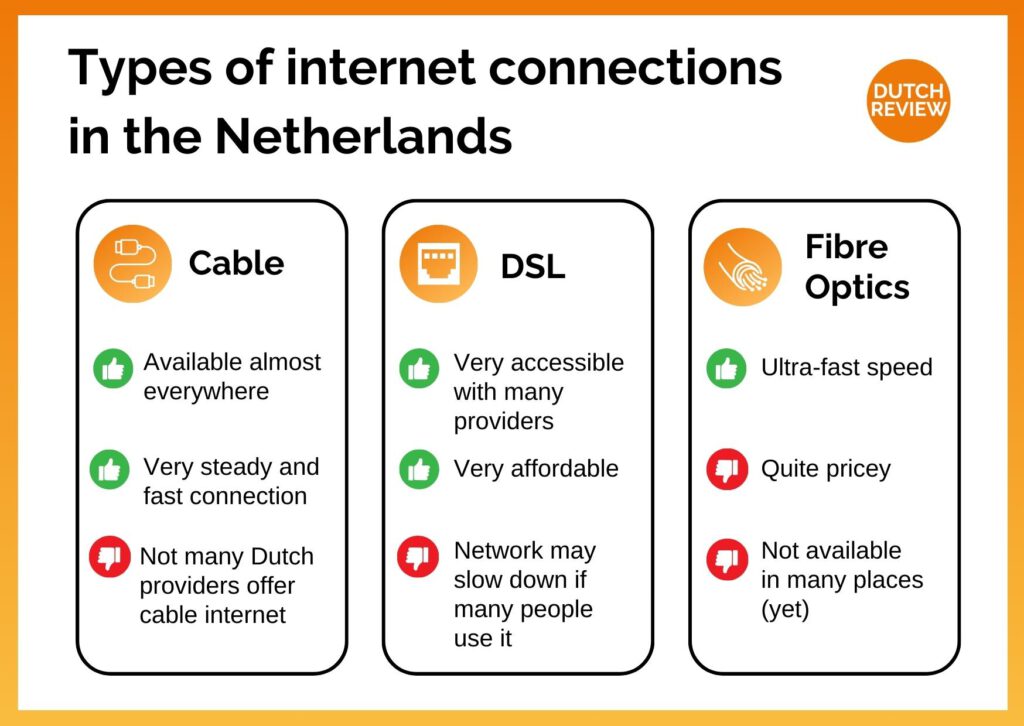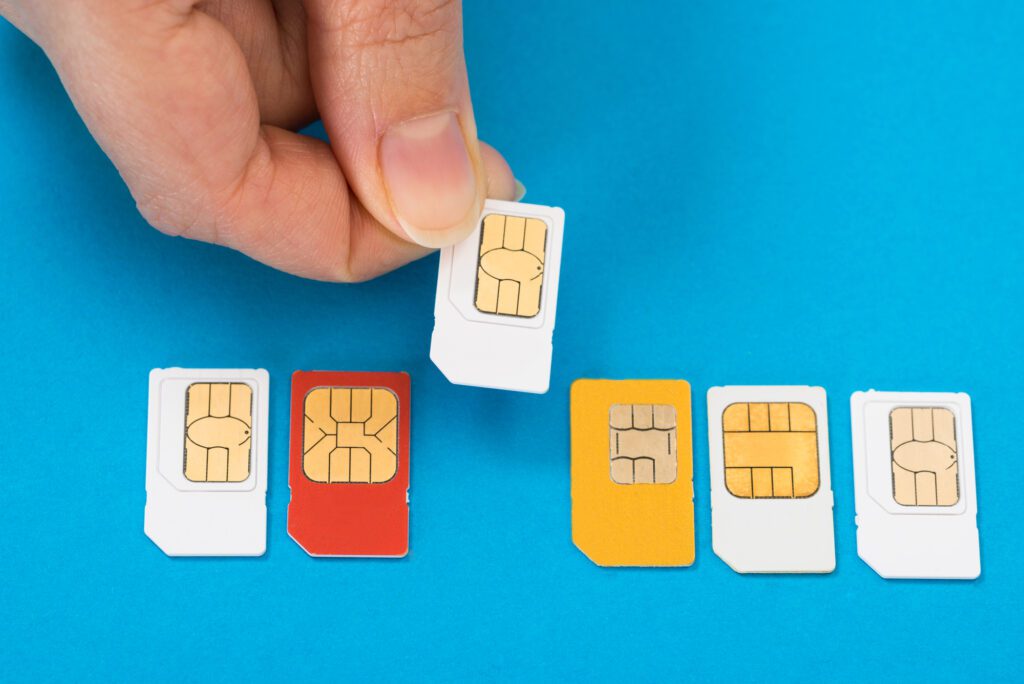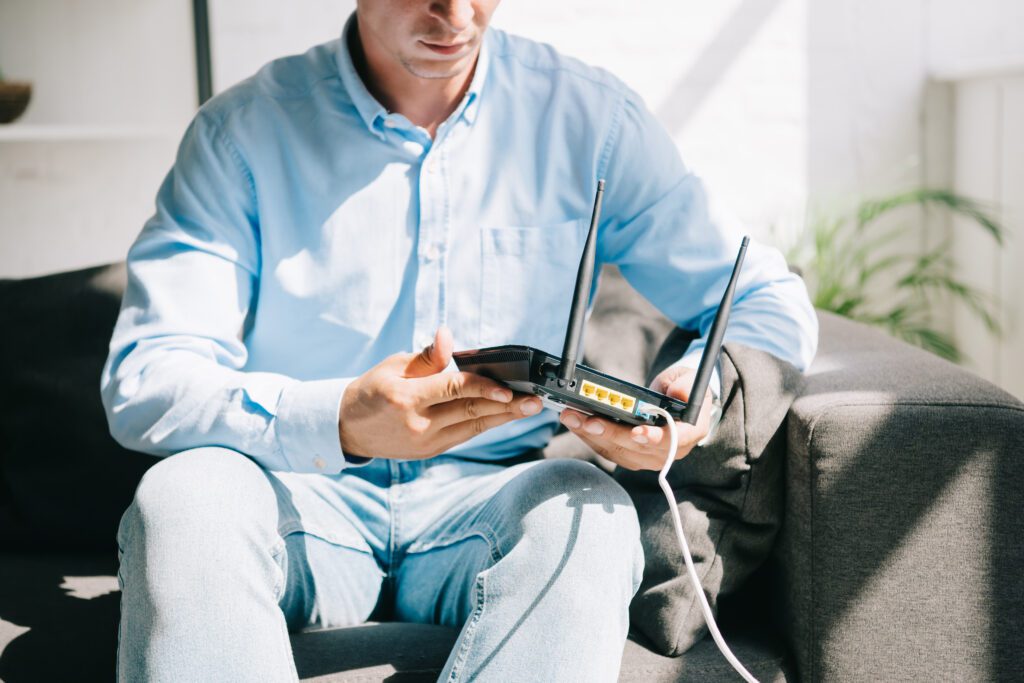The internet makes the world go round — and naturally, you want excellent WiFi at your Dutch house.
Whether you’re moving to the Netherlands or within it, setting up your internet is one of the first steps you’ll want to take. But before you can do so, there are some questions you may have. Let’s get those out of the way!
Wanna have your most burning questions answered AND your WiFi sorted for you? Try Utility Direct! Their team of experts is passionate about connecting expats with excellent Dutch service providers and closely monitors the market to get you the best possible deals.
1. What types of internet connections are available in the Netherlands?
Let’s start with the basics: the types of internet connections available in the Netherlands.

It’s important to know that the type of connection you have depends on your home. The most common connections in the Netherlands are the following:
- Cable: Cable Internet uses the infrastructure of your cable TV network to provide Internet services.
- DSL: DSL internet runs through standard phone lines that are wired into your home.
- Fibre optics: Fibre optics transmit data using pulses of light sent through extremely thin strands of glass or plastic fibres.
To figure out which type of connection your home has, you can simply ask your landlord — or have a quick look around your home.
Each of these three connection types has pros and cons:

2. What is the fastest internet network in the Netherlands?
Once you’ve determined the type of internet connection you have in your home, it’s time to choose a provider — but who offers the fastest network?
You’ll be happy to hear that your internet will be pretty speedy no matter which Dutch internet provider you choose. In fact, as of 2023, the Netherlands has the 21st fastest internet in the world, with an average internet speed of 209.11 Mbps (megabits per second).

But in an effort for Dutch internet to become even faster, many Dutch web service providers are currently expanding their fibre optics network (most notably KPN, Vodafone and Odido) — to offer even better speeds to their customers.
In other words: no matter which provider you choose, chances are that you’ll have a (slightly) above-average internet speed almost no matter where you settle in the Netherlands.
However, if you want the fastest possible connection, opt for a provider that offers fibre optics.
3. Which is the cheapest Dutch internet provider in the Netherlands?
As with many things, the price of your internet connection in the Netherlands depends on factors such as the provider and plan you choose.
Prices for internet-only subscriptions in the Netherlands can range anywhere from €32 per month to €70 per month.
The cheapest Dutch internet provider out there is YouFone, currently offering an internet-only subscription for €32 per month.
That said, many providers offer special deals such as bundle packages for internet and TV, or half of the first year at a reduced rate.
The best thing you can do is compare prices and policies online, and pick the one that suits your needs best.
| Provider | Price per month (internet only) | Internet speed |
| Odido | €35 | 100 Mb/s |
| Ziggo | €42.50 | 100 Mb/s |
| YouFone | €43 | 50 Mb/s |
| Online.nl | €32 | 50 Mb/s |
| KPN | €42.50 | 100 Mb/s |
Let op: The actual internet speed can depend on your address. Also keep in mind that these are the flat rates offered by providers, but special promotions could bring the monthly price down!
Can’t be bothered to read your way through endless offers and compare prices? We feel ya. That’s why we recommend Utility Direct. They’re specialists in finding the best deals for expats in the Netherlands — and they’ll find the best internet provider for you!
Curious? Reach out to Utility Direct for a personalised offer!
4. Bundle options: are they worth it?
In the Netherlands, we love a good ol’ actie (deal) or korting (discount) — but are they the way to go when it comes to your internet provider? The answer is: it depends.
In the Netherlands, most internet providers will want to offer you TV and internet as a bundle. If you want access to Dutch television anyway, bundling it with your internet services is the way to go, as it can save you quite a bit of your hard-earned euros.

If you’re unsure, it’s essential to check whether the offered channels, services (some TV packages now include access to streaming services like Netflix or Hulu), and internet speed meet your needs.
READ MORE | Televisie in the Netherlands: your guide to the best and worst of Dutch TV
You should also consider the terms of your contract, and make sure that the bundle offers enough flexibility — not only when it comes to the cancellation policy, but also in adjusting your package over time.
| Provider | Price per month (internet + TV) | Internet speed | Number of TV channels |
| Odido | €47.50 | 100 Mb/s | 67 |
| Ziggo | €56 | 100 Mb/s | 74 |
| YouFone | €49.50 | 50 Mb/s | 51 |
| Online.nl | €44.50 | 50 Mb/s | 86 |
| KPN | €55 | 100 Mb/s | 73 |
5. Can I use mobile data as my home internet in the Netherlands?
If you’re looking at different options for internet connection in the Netherlands, you may have considered using mobile data for your home internet — and that is certainly an option.
The Netherlands’ fast 4G network ensures that you can surf the web at high speed from all your devices. In fact, with some providers, such as KPN, 4G availability throughout the country is over 99%.
As a result, many Dutch phone providers offer data plans suitable for home use. How does it work? The same as the mobile hotspot on your smartphone!
If you opt for this option, you will receive a SIM card with data access, and your provider will likely offer you a mobile hotspot device or a mobile router. These will allow you to connect your devices (laptop, PC, smartphone, smart TV) to the mobile network.

While using mobile data as your home internet can be a handy option — especially if you’ve just arrived in the Netherlands and have many things left to figure out — there are some drawbacks to it:
- Slow speeds: If you’re a gamer or like to stream videos on multiple devices, this method is not the best for you.
- Data limits: If your data plan is not unlimited, you may quickly get hefty bills for exceeding your limit while surfing the web.
- Higher costs: Mobile data plans, especially those with generous or unlimited data allowances, tend to be more expensive in the long run than traditional home broadband options.
6. How do you choose the right web service provider in the Netherlands?
In today’s world, we all surf the internet constantly, for things from streaming our favourite shows to working from home and everything in between — so it’s important to choose an internet provider that fits your needs.
The most popular internet providers in the Netherlands are Ziggo, KPN, and Odido (formerly T-Mobile and Tele-2), but which of them is right for you depends on multiple factors.
You may want to consider things such as:
- Customer service
- Availability in your area
- Speed
- Connection types
- Contract terms and pricing
- Special discounts/promotions
7. How do you set up your WiFi in the Netherlands?
Found the perfect provider? Then, it’s time to get your WiFi going in your Dutch home!
Setting up your router can seem hard, but if you know how to do it, it’s as easy as appeltaart! Let us lay it out for you.

1. Getting your equipment ready: Once you order your WiFi package, your provider of choice will ship you all the necessary equipment to your house. To set it up, you’ll need the router, an internet connection, and a device (like a computer or phone) to connect.
2. Placing your router: The router will send a WiFi signal through your home — that’s why it needs to be in the right spot to get the best coverage. Put it in a central location!
3. Getting it to work: Next up, your router must be plugged in using the provided power plug. After that, you should be able to connect your device to the internet using the provided WiFi password.
4. Testing your connection: Connected? Congrats! Now, you can test your internet speed using an online tool such as SpeedTest by Ookla or Fast.com.
5. Secure your WiFi: If you want to give your WiFi some extra protection, you can change the password to access it. To do so, enter the router’s IP address in your internet browser and log in with the default login details provided by your provider.
6. Troubleshooting: If you ever run into issues with your internet, try restarting your router. If the issue persists, check for any storingen (interferences) in your area. If there is one, you may just have to wait a bit. Can’t manage to fix your connection? Contact your provider!
Et voilà, you have successfully set up your Dutch WiFi! 👏
Ready to surf the web? In the Netherlands, it’ll be not just fast but also safe. Enjoy!
Do you have any more questions about Dutch WiFi? Ask us in the comments!
